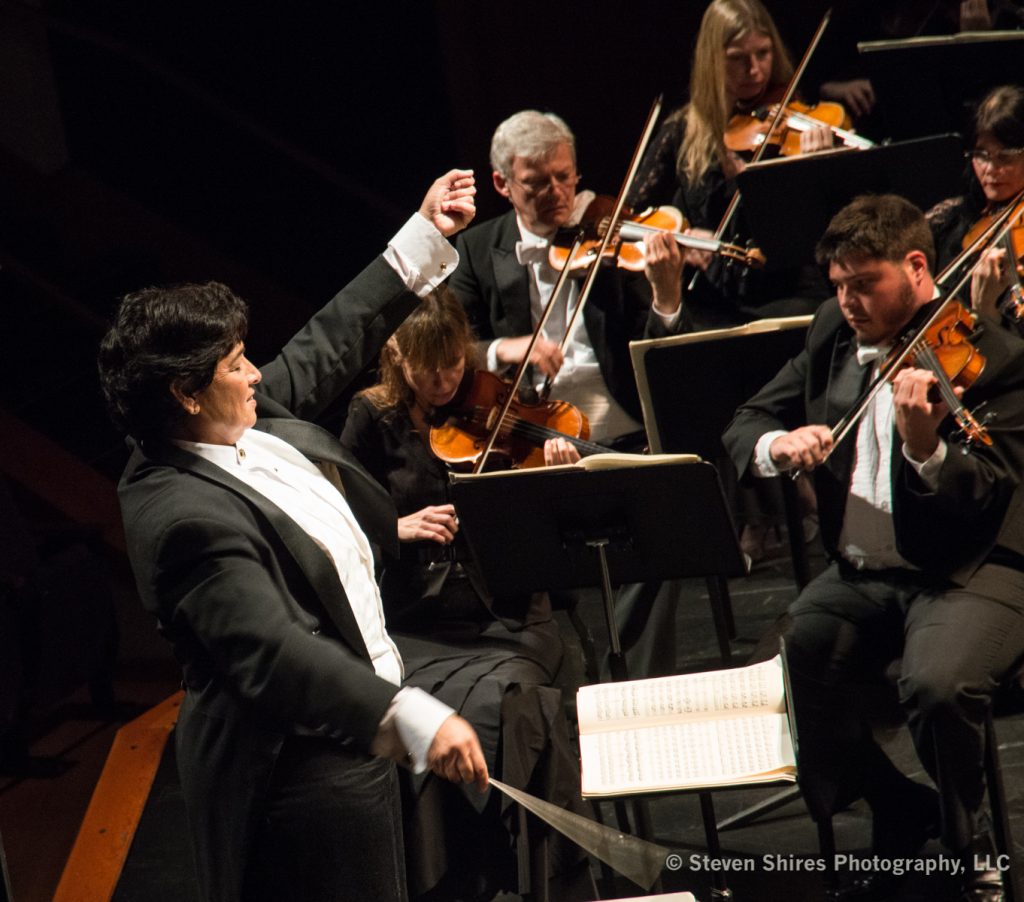
The South Florida Symphony is a musical organization that likes to think big.
In the first classical concerts of the season (a pops concert took place in November), the Fort Lauderdale-based ensemble took on an echt-Romantic violin concerto, a world premiere score, and one of Richard Strauss’s enormous tone poems. Credit the group and its maestra, Sebrina María Alfonso, with wanting to make an impact and managing mostly to bring it off.
The concert Jan. 22 at the Kaye Auditorium on the campus of Florida Atlantic University in Boca Raton, the first of four presentations of this program from Boca south to Key West, introduced a fine young American violinist, Tessa Lark, in the Violin Concerto of Erich Wolfgang Korngold. The composer was a celebrated prodigy in Austria before decamping to the United States and becoming a major writer for film. His Violin Concerto, written in 1945, uses material from four of his movie scores, and its Hollywood Golden Age lushness has helped move the work in recent years into the standard repertory.
Lark, a native of Kentucky who won the Avery Fisher Career Grant this past year, was playing this concerto for the first time in four appearances with the South Florida Symphony. Her Boca performance was the first time she’d played it in public, and she did so with sparkle and accuracy, carefully carving out the yearning opening theme with precision and suavity and making short work of the acrobatics that followed.
In the second-movement Romanze, Lark played the main theme with a sweetness and a simplicity that was very affecting, in part because she made good use of the softer dynamics. Her affinity for Appalachian fiddle music came out in the boisterous third movement, when she gave its opening moments a strong sense of high spirits. Overall, it was a fine reading of this concerto, but Lark could surely do more with it after more experience with it; there was a certain tentativeness here and there that will vanish as she gets to know the concerto better.
The orchestra, which was extra-large, had a satisfying roundness and breadth of sound that was well-suited for this music, and they accompanied Lark with sensitivity. But they needed to be quieter in general, and Korngold’s music needed much more dynamic contrast. It’s written with a Mahlerian sense of soft to loud, but most of the orchestral playing here was in the middle range, and that deprived the music of a good deal of its subtlety.
The concert opened with a world premiere, The Legend of Bird Mountain, by Fort Lauderdale-based composer Tom Hormel. A grandson of the Hormel Foods founder and a noted environmental activist, Hormel, who is in his late 80s, wrote this music for use as a ballet score. The half-full house at the Kaye Auditorium acclaimed the work, but in all honesty it has little to recommend it.
It starts mysteriously with quiet strings and some Dvořákian wind statements, then spends much of the rest of its time anchored in one key, underpinning an overall motivic and harmonic landscape that reminded one of a film score for a middling medieval epic or the music for a budget Dungeons and Dragons-style video game. It ends rather incongruously with an up-tempo hora that contrasts quite oddly with the music that came before.
All credit to the orchestra for showing the piece respect and playing it as well as they could, and to Alfonso for wanting to program a new work by a local composer. But Legend from Bird Mountain strikes me as a very bad piece, despite the audience’s embrace of it, and the best place for it would have been on a pops program rather than up against Korngold and Richard Strauss.
The concert closed with Also Sprach Zarathustra, Strauss’s sprawling apostrophe to Nietzsche, famous for its 2-minute opening fanfare, which never fails to impress. The rest of the work is brilliantly orchestrated and full of sensational effects and rich color, though it has lost some of its luster over the years, probably because of its less-than-inspiring secondary material.
I was late returning to my seat, and missed the fanfare, but the orchestra played the rest of the work quite well, with some good work in the solo spotlight by concertmaster Dilyana Zlatinova-Tsenov. This is a highly skilled bunch of musicians, and while the performance didn’t meet the standard of the best orchestras, it was a good reading of this work, and Alfonso led it with vigor and style.